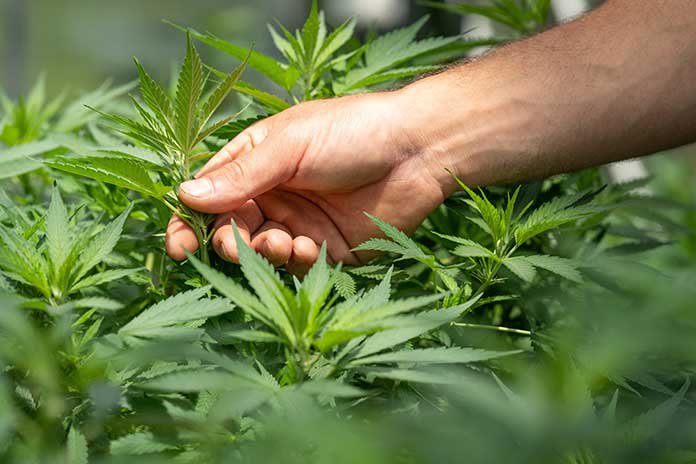Increased heart rate and blood pressure are among the first health effects of prolonged recreational cannabis use. But you can also feel a sense of euphoria, detachment from reality, and relaxation. This, at least, is what we know because the studies published so far have some limitations that we must consider. Cannabis, or hemp, is a herbaceous plant whose use in the textile field is witnessed by finds dating back to the Neolithic (Stone Age). However, this plant can also be used for therapeutic or recreational purposes. Let’s see together what the secondary health effects of recreational use of cannabis can be.
The Active Ingredients
Cannabis contains many active ingredients among which, the most important are:
- THC: tetrahydrocannabinol has psychotropic effects. Cannabis sold illegally for recreational purposes usually contains higher concentrations of this active ingredient.
- CBD: cannabidiol has no psychotropic effects. Legal cannabis contains this active ingredient.
Effects On Health
Cannabis produces intense and rapid effects and can cause long-term health risks. One of the first effects following the intake is increased heart rate (tachycardia) and blood pressure. To this are added:
- Sense of euphoria
- Alteration of time, sounds, colors
- Detachment from reality
- Uncontrollable laughter
After that, there is a state of peace, relaxation, reflective experiences, and difficulty in moving. It will be challenging to think, concentrate and move. Following an abuse of this substance, side effects such as anxiety, depression, hallucinations, delusions, and psychosis can occur. To these can be added fertility problems and, in pregnant women, abuse can cause brain problems in the unborn child.
The effects experienced after taking cannabis for recreational purposes, the one in which there is more THC, vary according to the user’s predisposition, personality, psychological conditions, and the presence of clinical conditions. The advice is to turn to legal channels to purchase Cannabis (CBD), the intake of which determines therapeutic effects. There is no risk of incurring significant side effects since production follows an exact and controlled process. In short, as always, make conscious use of it.
Also Read: Is It Possible To Make Your Own CBD Oil?
Cannabis And Psychiatric Disorders
Consumption has been associated with an increased risk of developing psychiatric disorders. Occasional or continuous use can increase the risk of developing many psychiatric disorders such as psychosis, panic attacks, and depression, resulting in suicide attempts.
side effects related to both occasional and continuous use of cannabis; they can be of three types:
- Anxiety and panic attacks, particularly in new consumers
- Psychotic symptoms (in the case of consumption of high doses), which are more easily encountered in those who start using cannabis in adolescence
- Road accidents related to driving in a state of intoxication
Adverse effects associated with regular cannabis use are:
- Addiction syndrome (observed in about 10% of users)
- Chronic bronchitis
- Psychotic symptoms, particularly in subjects with previous psychotic episodes or with a family history of these disorders
- Reduced level of education in adolescents
- Cognitive impairment (for everyday habitual consumers for more than ten years)
Other possible side effects identified by the authors related to the regular consumption of cannabis with unknown causal relationships are:
- Respiratory tract tumors
- Behavioral disturbances in children whose mothers used cannabis during pregnancy
- Depressive disorders, mania, and suicide
- Use of other illicit drugs by adolescents
The problems arising from the use of cannabis are addiction to cannabis and abuse of cannabis. The mental disorders induced by ‘ abuse of cannabis are:
- Intoxication
- Delirium from intoxication
- Psychotic Disorder (with delusions or hallucinations)
- Anxiety Disorder
Disorders not otherwise specified: Delusional Disorder, a syndrome (usually with persecution delusions) that develops soon after cannabis use. It can be associated with marked anxiety, depersonalization, and emotional lability and can be misdiagnosed as schizophrenia. Amnesia may occur after the episode. On the other hand, occasional use can generate symptoms that could be misdiagnosed as panic attacks, major depressive disorder, delusional disorder, bipolar disorder, or paranoid schizophrenia.
Cannabis For Therapeutic Use
Cannabis And Epilepsy
The fact that cannabinoids can modulate and balance the mechanisms of neuronal excitability and act specifically on the function of mitochondria (both biological phenomena closely related to neuronal damage from oxidative stress and epileptic disease). This study hypothesizes that the anti-epileptogenic potential of cannabinoids is carried out through the recovery of neuronal dysfunctions that lead to oxidative damage. The anticonvulsant effect of cannabinoid molecules is strictly dependent on its “belly” effect, i.e., there is a narrow effective dosage range, below or above which these cerebral system agonists are ineffective or, worse, pro-convulsive.
Cannabis And Chronic Pain
Israel is the leading country in research on medical cannabis. The effects of cannabis play a role in appetite, pain sensation, mood, and memory. Despite controversial views, cannabis has earned a prominent place as a remedy in relieving those who have cancer, post-traumatic stress disorder (PTSD), and ALS. The substance is known, where other drugs fail, to soothe pain, increase appetite and reduce insomnia.
Also Read: Everything You Need To Know About CBD Oil

